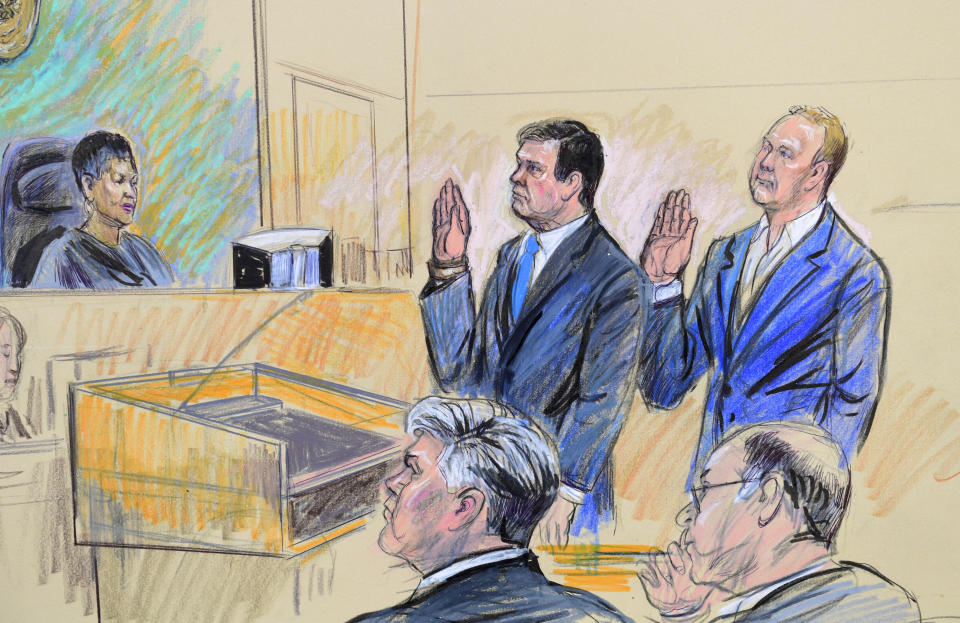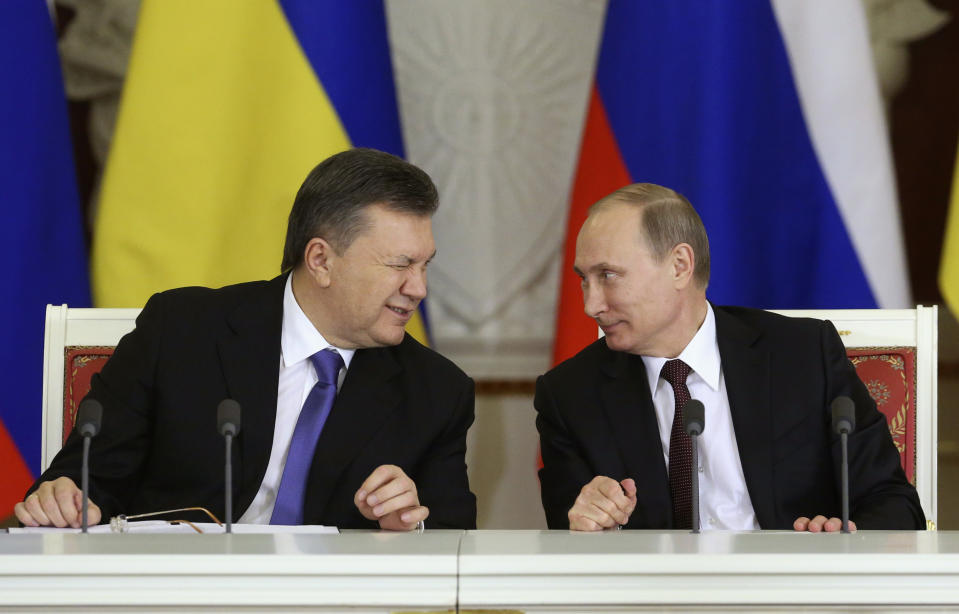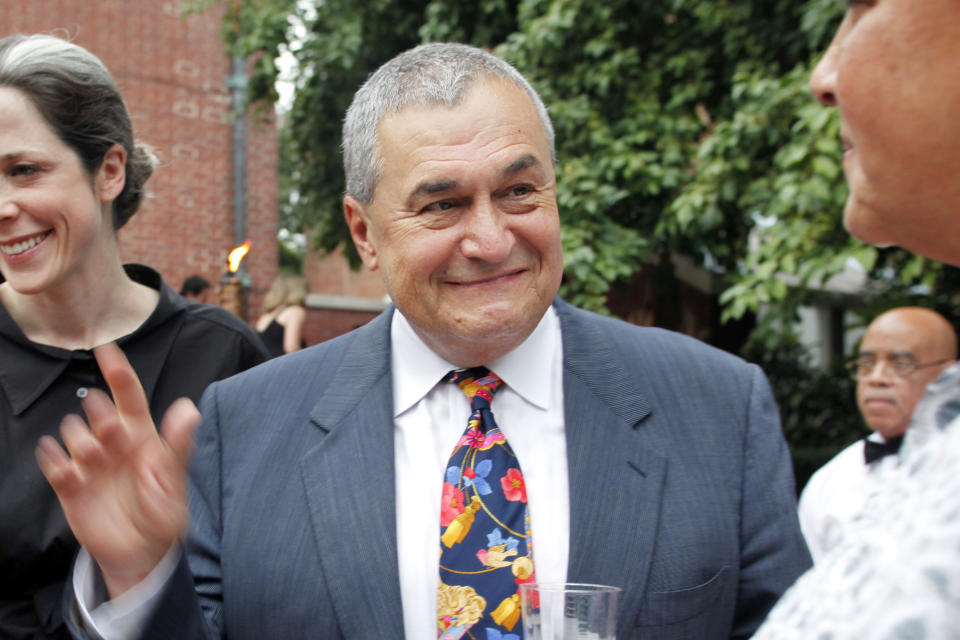Manafort charges grew out of records seized in 'no-knock' raid
The FBI’s predawn search of Paul Manafort’s northern Virginia home in July yielded important new evidence crucial to the indictment of Donald Trump’s campaign chairman and one of his close associates, according to the indictments unsealed yesterday by special counsel Robert Mueller.
The “no-knock” raid by agents who picked the lock on Manafort’s front door turned up records showing the longtime political operative had been directly involved in a secret lobbying campaign on behalf of a Ukrainian political party closely aligned with Vladimir Putin’s Russian government, according to the court papers. Manafort, who ran Trump’s campaign for several crucial months last year, has been charged, along with his longtime business partner Rick Gates, with running a scheme to conceal and avoid paying taxes on millions of dollars in fees they collected for their work.

Manafort and Gates appeared in federal court in Washington and pleaded not guilty to all charges. Manafort and Gates were both released to home confinement. Manafort was freed on a $10 million bond meant to guarantee his future court appearances. Gates’s bond was $5 million.
Outside the courthouse, Manafort attorney Kevin Downing attacked the charges, saying “there is no evidence that Mr. Manafort or the Trump campaign colluded with the Russian government.”
The cache of lobbying records appears to be crucial to some of the charges against Manafort and Gates. The two men had previously sought to conceal information about their role in the Ukrainian lobbying campaign — which took place before they joined the Trump campaign — developing a “false and misleading cover story” to distance themselves from it and providing “false talking points” to one of the lobbying firms it hired, the indictment charges.
Asked twice by the Justice Department — in November 2016 and February 2017 — for any records that they had on the past Ukrainian lobbying effort, their consulting firm, DMI, responded that it “does not retain communications beyond 30 days” and as a result of this policy, a “search has returned no responsive documents.”
But the whole time, the indictment reveals, at least some of those records were stashed in Manafort’s home. Those records helped Mueller put together a case accusing Manafort and Gates of serving as “unregistered” foreign agents by engaging over an eight-year period in a “multimillion dollar lobbying campaign” that was done “at the direction” of former Ukrainian President Viktor Yanukovych and his pro-Russian Party of Regions. Yanukovych is now living in Moscow.
Jason Maloni, a spokesman for Manafort, said in an emailed statement: “Mr. Manafort represented pro-European Union campaigns for the Ukrainians, and in the course of that representation he was seeking to further democracy and to help the Ukrainians come closer to the United States and to the EU. Those activities ended in 2014, two years before Mr. Manafort served in the Trump campaign.
“Today you see an indictment brought by the Office of Special Counsel that is using a very novel theory to prosecute Mr. Manafort regarding a FARA filing. The United States government has only used that offense six times since 1966 and only resulted in one conviction.
“The second thing about this indictment that I, myself, find most ridiculous is a claim that maintaining offshore accounts to bring all your funds into the United States, as a scheme to conceal from the United States government, is ridiculous.”

The Ukrainian lobbying charges are only one part of a 12-count indictment against Manafort and Gates that also accuses them of money laundering and tax evasion related to over $21 million they had socked away in offshore accounts in Cyprus, the Seychelles and other money-laundering havens.
Although not directly related to allegations of “collusion” between the Trump campaign and Moscow, the charges — especially as they relate to the secret lobbying campaign on behalf of pro-Russian interests in Ukraine — could prove awkward for the White House on several fronts.
Manafort was for a while the senior official in the Trump campaign, serving as campaign chairman and de facto manager through the Republican convention until he was fired in August 2016.
Gates, Manafort’s longtime business partner, was his top campaign deputy and continued to remain in Trump’s orbit well after Manafort was replaced. He played a key role in planning Trump’s inauguration last January, serving as a top deputy to inaugural committee chair Thomas Barrack. He was also “in and out of the White House” during the early days of the Trump presidency, a White House adviser who recalls seeing him there told Yahoo News on Monday.
More recently, the adviser says, Gates has been working for Barrack, telling associates he was helping the private equity mogul — a close friend of Trump’s — purchase portions of the entertainment empire owned by the Weinstein Company, the firm that recently fired its co-founder Harvey Weinstein over allegations of sexual assault and harassment.
The Mueller indictment also could pose difficult questions for two major Washington lobbying firms, the Mercury Group and the Podesta Group — headed by Tony Podesta, a major Hillary Clinton fundraiser and brother of Clinton campaign chairman, John Podesta. Tony Podesta resigned as head of his firm today, shortly after the Manafort indictment was announced.
Both firms were hired by Manafort and Gates in 2012 to conduct the Ukrainian lobbying effort — which was nominally on behalf of a Brussels-based nonprofit called the European Centre for a Modern Ukraine. Both firms said in statements last year they never registered with the Justice Department as foreign agents because they had been assured that the European Centre was an independent group created by Ukrainian businessmen and was not controlled or financed by a foreign government or political party.

But according to the indictment, the European Centre was a front group that “was under the ultimate direction of the government of Ukraine, Yanukovych, and the Party of Regions.” The Washington lobbying firms were paid more than $2 million — not by the center but by offshore accounts associated with Manafort and Gates in Cyprus and the Grenadines, the indictment charges.
The indictment suggests that the two lobbying firms had been explicitly informed about the center’s connection to the Yanukovych regime. Gates wrote one of the firms, identified in the indictment only as “Company A,” that it would be “representing the government of Ukraine in [Washngton] D.C.,” the indictment states.
And both firms were told in November 2012 that they needed to prepare an assessment of their past and prospective lobbying efforts so the “president” — an apparent reference to Yanukovych — could be briefed by “Paul” on “what Ukraine has done well and what it can do better as we move into 2013.”
At the direction of Manafort and Gates, both firms then engaged in “extensive” operations that included lobbying multiple members of Congress and their staffs “about Ukraine sanctions, the validity of Ukraine elections, and the propriety of Yanukovych’s imprisoning” of one of his presidential rivals, Yulia Tymoshenko.
After news stories first surfaced about their lobbying work on behalf of the European Centre in the summer of 2016, both firms retroactively filed with the Justice Department as foreign agents for the Ukrainian political party under the Foreign Agents Registration Act.
A spokesperson for the Podesta Group said the firm “is cooperating with the special counsel.” The spokesperson also noted in an emailed statement that the firm had filed with Congress at the time as lobbyists for the European Centre under the Lobbying Disclosure Act, a different statute that requires far less detail than the foreign agents law.
“The Podesta Group has fully cooperated with the special counsel’s office and taken every possible step to provide documentation that confirms compliance with the law,” the spokesperson said. “Based on the advice of expert outside counsel and in-house counsel, the firm filed the appropriate public disclosures of its representation of the ECFMU over five years ago, in 2012, and in eight subsequent public filings. The Podesta Group’s work for ECFMU, a nonprofit, was in support of Ukraine’s admission to the EU, a position supported by foreign policy experts at the time. The ECFMU provided formal certification that it was neither funded by nor directed by a foreign government or political party.”
Michael McKeon, a partner in Mercury, emailed a statement that said in part: “Mercury worked for the ECFMU with the intention of aligning Ukraine with western democracies generally, and the European Union specifically, on security, political and economic issues. Mercury retained legal counsel to determine the proper method of disclosure of such representation and followed the advice of such counsel . . . Mercury has and will continue to fully cooperate with the Office of the Special Counsel in its investigation. Mercury believed our work was intended to serve an important and proper purpose.”
_____
Read more from Yahoo News:


